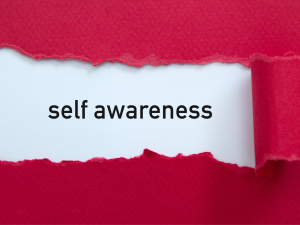Self-Awareness – The Foundation of Effective Leadership
December 13, 2022

In the Golman-Korn Ferry model of Emotional Intelligence that we use in our classes and corporate training sessions, self-awareness is the foundational element of the 4-factors considered to represent emotional intelligence. In fact, research has indicated that it is highly unlikely anyone will exhibit self-management, social awareness, or relationship management without self-awareness. self-awareness has now been co-opted directly or indirectly by many leadership approaches because it is significantly related to leadership effectiveness. What is it, and how can it be developed?
Self-awareness is defined in many ways that basically boil down to recognizing and understanding your emotions, drivers, strengths, and weaknesses. It enables you to sustain your positive efforts over time, despite setbacks. It includes understanding what specific emotions you are feeling (emotional granularity) and how they are changing moment by moment and being able to reflect on your interactions as they are influenced by these emotions, determining their effectiveness in a particular situation. It doesn’t sound easy, and it’s not: Dr. Louis Cozolino, a psychologist and professor of psychology at Pepperdine University, notes, “Although our brains have evolved to predict what others are thinking, they are lagging behind in self-knowledge. Whereas projection is reflexive and lessens anxiety, self-awareness requires effort and a willingness to tolerate the anxiety it can create.”
However, you know it when you see it. Self-aware individuals understand that their perceptions are only one of at least two in every interaction. They are curious and seek to understand. They recognize where their emotions come from and plan their interactions accordingly, thoughtfully analyzing successful and unsuccessful attempts at connecting with others. Individuals not displaying this skill tend to make the same relationship mistakes over and over. They perseverate in behaviors that are unhelpful in interactions.
If this is so difficult, how can we develop self-awareness?
Like any skill, some individuals are naturally better at it than others. For example, if your caregivers encouraged you to examine and name your emotions when you were a child, you should take time to thank them for helping you develop self-awareness at an early age. However, like any skill, it can be improved by asking for feedback and/or soliciting 360 feedback via a reliable and validated instrument. In our classes and corporate training sessions, we use various instruments depending on our stakeholders’ needs, including but not limited to the Emotional and Social Competency Inventory and the Leadership Practices Inventory.
Of course, while self-awareness is necessary, it is not sufficient for effective leadership. For example, a leader could be exceptionally self-aware that her frequent outbursts cause her employees to cringe whenever she walks into a meeting; however, she has become addicted to the feeling of power this gives her, i.e., “I’m a jerk, and I like it!” This is exemplified by a leader who fired team members at the drop of a hat because “they said something that flew all over me.” (True Story).
Once a leader develops self-awareness, she can work on strategies to manage her emotions (self-management) and use this to understand and interact with others more effectively (social awareness and relationship management), becoming the resonant leader who empowers her challenged team to accomplish great things.
Suzette Plaisance Bryan, PhD, SPHR, GPHR, SHRM-SCP
Director OBCC Leadership Center